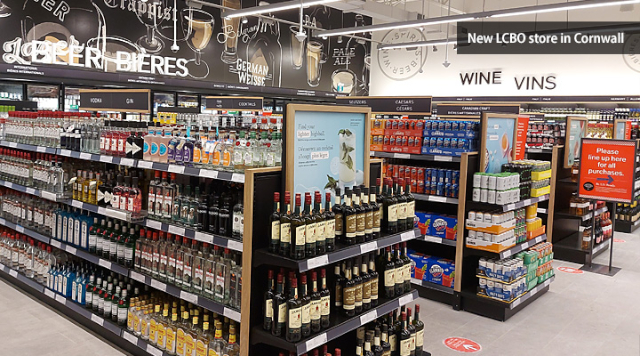Canadians aren’t the biggest drinkers in the world. But we are well aware of the rising cost of every-thing edible and drinkable. And – especially after we’ve visited abroad – the question inevitably pops up: “Why is booze so expensive in Canada?”
 A typical LCBO store: The Board controls all sales of
A typical LCBO store: The Board controls all sales of
Beer, Wine and Spirits, domestic and imported…
How many times have you heard someone on TV or min a movie brush of a sensitive question with the meaningless throw-away, “It’s complicated…” I’ve come to think of it as a trope screen writers fall back on when they’ve written themselves into a corner…
Conflicting statistics
Statistics Canada’s report on Alcohol consumption for the last full calendar year on record (2023), paints a contradictory picture. Drinking is down by a little more than 2 percent over the previous year. But alcohol sales revenues and profits were up.
“Federal and provincial governments earned $15.5 billion (+2.5%) from the control and sale of alcohol ($13.6 billion, +0.1%) […] in the fiscal year ending March 31, 2023,” the report summs up. “This includes net income from provincial liquor authorities, excise taxes, retail sales taxes, other specific taxes, and licenses and permits.”
So what, exactly, determines the retail price of booze?
Post-grad economics?
Alas, ‘It’s complicated’ may actually be the only way to describe the Canadian beverage alcohol pric-ing situation into two simple words. it turns out, there are a number of compounding, sometimes conflicting forces at work…
Mandated minimum price
Did you know that in Ontario the provincial government not only directly controls beverage alcohol sales, but sets a minimum price for the commodity? That’s a holdover from ‘ancient times’, when I was a young drinker. Some decades back, Ontario was known as puritanical enclave lagging behind other jurisdictions, which were easing up on restrictions surrounding the ‘permitted sins’.
The idea was to at least appear to be discouraging the ‘sin’ of drinking by setting prices arbitrarily high. It was a political plot to placate a pious proletariat. But that was only the base price.
Markups
Like all products, alcoholic beerages are subject to markups at the retail level. Even when the gov-ernment sells to the public directly – as with the Liquor Control Board of Ontario (LCBO) and the Quebec Liquor Commission (QLC) – a markup is added to the price, ostensibly to cover operating costs for the distribution network and stores.
Duties and taxes
That little paper strip over the top of the bottle cap is a duty stamp. It’s proof that the federal gov-rnment has received its tribute, applying a surcharge to the product’s price along the way. Each province also adds a layer of tax to the pile.
And then, there are also federal and provincial sales taxes on top of that.
Climate change
Climate change has had an indirect but significant affect on the price of booze over the past few years. The cost of brewing and distilling ingredients – mainly grapes and grains – has risen sharply due to the impact on crops of global warming.
In Canada, for example, BC wine growers have received massive government relief following a general grape crop failure last year, and an anticipated failure this year. They are actually importing grapes from other wine growing regions to allow them to keep making their most popular labels.
And, of course, inflation…
Of course. There’s inflation on top of everything else. The effects of rising costs for everything work in mysterious, insidious ways. They compound on one another as the a product moves through the supply chain…
My take
Canada’s relatively high booze prices are, indeed, the result of a complex, compounding, confusing system that sometimes imposes taxes on goods already taxed and lets governments double- or triple-dip, through duties, overlaid with taxes, overlaid in turn with retail sales taxes.
It’s a crazy system. But it’s all-Canadian. And we’re used to it.
Nevertheless, it’s a curious social phenomenon that we all complain about it…
~ Maggie J.

